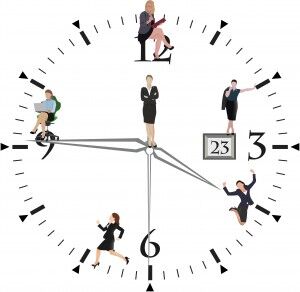By Plum Cluverius, MA/ABS, PCC
 How often do you feel overwhelmed by everything you have to get done? How many times have you wished for more than 24 hours in a day?
How often do you feel overwhelmed by everything you have to get done? How many times have you wished for more than 24 hours in a day?
It often seems like we never have enough time yet as we’ve heard all too often, we have all the time there is. Even if you’re staying on top of things, the pressure and stress of going non-stop constantly takes a toll physically and psychologically.
In the book The Power of Full Engagement by Jim Loehr and Tony Schwartz, stress and lack of time is not the problem rather the lack of recovery. What Loehr means is that all human bodies operate on a principle called oscillation. We work, then rest. We work again, then we rest again. A quick way to notice this is to pay close attention to your breath. At the end of each inhalation, there is a brief pause before the exhalation begins. There is another pause at the end of each exhalation. This rhythm pattern continues throughout out bodies—as our heart beats, as our muscles contract and relax.
The period of rest/recovery is critical for peak performance. Loehr first noticed the significance of recovery while coaching elite tennis athletes. He spent hours watching these athletes in tournament situations trying to determine the differentiator between good and great players. He couldn’t discern any noticeable difference in skill level but what finally caught his attention was what players did between tennis points, when play had stopped. The best players, he noticed, paused, relaxed and concentrated—even if they had just missed a shot. The lesser players would get more active, maybe berating themselves or throwing down a racquet. Over time, the players who never relaxed performed worse than players who used the time between points and sets to recover.
We aren’t really that different from an elite tennis player. If we work constantly without a break we run out of mental energy. We become less focused, it takes us longer to get something done. The oscillation period is between 90 – 120 minutes. That means we can concentrate fully for about an hour and a half before our energy wanes and we need to recover. Think about how exhausting those two hour meetings are!
The key to increasing our energy and our ability to perform at peak levels throughout the day is to make sure we have sufficient recovery time. It sounds somewhat counter-intuitive, but we need to stop working and rest for a few minutes regularly to get more done. Rest doesn’t have to mean taking a nap! Recovery can happen when we stop using our minds for even a few minutes and clear our heads. Take a brisk walk, eat a healthy snack, Listen to your favorite song, have a quick chat with a friend or do a relaxation exercise.
recovery time. It sounds somewhat counter-intuitive, but we need to stop working and rest for a few minutes regularly to get more done. Rest doesn’t have to mean taking a nap! Recovery can happen when we stop using our minds for even a few minutes and clear our heads. Take a brisk walk, eat a healthy snack, Listen to your favorite song, have a quick chat with a friend or do a relaxation exercise.
It’s all Good!
Rather than focusing on how to cram more and more stuff into our days, we would be well served if we tried to do a little less—if we paid more attention to creating time to recover. If we do this, Loehr says we will actually build our capacity to handle more stress and get more done. Think of it as the same process as building a muscle. When you exercise a muscle to the point it can’t do any more, you tear small fibers, which are then rebuilt into a stronger muscle when you rest. Without recovery, the muscles won’t get stronger. With recovery, we can build our capacity to handle the stress and pressure that comes with today’s busy lives.
If you would like to learn more about managing your energy please contact us at Arden Coaching.

